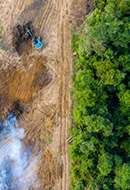Climate change, biodiversity and human health
Combating climate change and the benefits to biodiversity and health
At a time when the world is facing an unprecedented health crisis, the United Nations (UN) is stressing the importance of emphasising the role biodiversity plays in protecting us against the risk of infectious diseases such as COVID-19, while also urging us not to forget about the climate crisis that is affecting the planet.

The coronavirus crisis, which has caused thousands of deaths, paralysed the economy and transformed our way of life — through the lockdown — has been a wakeup call. Thus, we need a paradigm shift in the way we interact with nature that recognises the important existing link between our health and the threats posed by climate change and the degradation of natural ecosystems.
Climate change, a risk multiplier
The UN Secretary General, António Guterres External link, opens in new window., addressed this issue recently and launched a call to "act decisively to protect our planet from both the coronavirus and the existential threat posed by climate disturbances". In addition, Inger Andersen, the executive director of the United Nations Environment Programme (UNEP), says that "humanity is putting too much pressure on the natural world with harmful consequences and nature is sending us a message with the coronavirus pandemic and the current climate crisis".
External link, opens in new window., addressed this issue recently and launched a call to "act decisively to protect our planet from both the coronavirus and the existential threat posed by climate disturbances". In addition, Inger Andersen, the executive director of the United Nations Environment Programme (UNEP), says that "humanity is putting too much pressure on the natural world with harmful consequences and nature is sending us a message with the coronavirus pandemic and the current climate crisis".
In 2018, the World Health Organization (WHO) identified climate change as the biggest health challenge of the 21st century. On the one hand, it considers that it threatens all aspects of the society in which we live, while also acting as a multiplier of other major global risks, such as biodiversity loss. Its influence on health is evident and this is projected to grow parallel to global warming, both directly (exposure to high temperatures, extreme weather events) and indirectly (impacts on the natural and social ecosystems that our health ultimately depends upon, such as access to water and food).

Mitigating and adapting
What will the Earth look like in 2030?

Day for Biological Diversity
Global commitment to nature.

Biodiversity protection
We protect and preserve biodiversity on some of our projects.

Biodiversity loss
A risk for the environment and for humanity.
The impact of climate change on biodiversity and health
An example of this complex interaction has come to light with COVID-19, which is the latest in a long list of infectious diseases known as zoonoses that have been transmitted from animals to humans including Ebola, AIDS, avian influenza, etc. with serious consequences over the past few decades. Climate change is among the three biggest direct drivers of biodiversity loss, along with land-use change and species exploitation. The many goods and services biodiversity provides are thus being put at risk, including its function as a natural protective barrier against possible zoonoses through feedback mechanisms that dilute and block viruses and other pathogens.
In particular, climate change directly influences the environmental conditions that promote the abundance and distribution of pathogens, their vectors and hosts, and their means of transmission, and it also affects the frequency of outbreaks. Thus, growing scientific evidence suggests that outbreaks or emerging diseases may become more common as the climate continues to change and as its impact increases on biodiversity (droughts and fires, flooding, sea level rise, ocean acidification and deoxygenation, etc).

 SEE INFOGRAPHIC: The impacts of climate change and how they affect health [PDF] External link, opens in new window.
SEE INFOGRAPHIC: The impacts of climate change and how they affect health [PDF] External link, opens in new window.
Therefore, acting to mitigate climate change and to promote the transition to a decarbonised economy that is responsible towards nature, is also to act in favour of healthy ecosystems, a less vulnerable population and a more resilient economy. Despite the reduction in pollution levels resulting from the lockdown and economic shutdown during the COVID-19 pandemic, the climate crisis has not disappeared. Therefore, in conclusion, it is important to remember that it is essential to align the economic recovery measures with climate objectives and sustainability.




